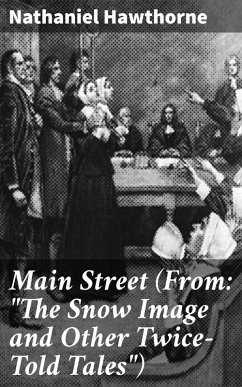
The Collection of Antiquities (eBook, ePUB)
Enriched edition. Obsession, Wealth, and Immortality in 19th-century Parisian Salons
Kommentar: Norcrest, Livia / Redaktion: Good Press / Übersetzer: Marriage, Ellen
Versandkostenfrei!
Sofort per Download lieferbar
0,49 €
inkl. MwSt.
Weitere Ausgaben:

PAYBACK Punkte
0 °P sammeln!
In "The Collection of Antiquities," Honorv© de Balzac intricately weaves a narrative rich with themes of memory, identity, and societal change within early 19th-century France. Written with his characteristic realism and a keen eye for detail, this novella captures the essence of nostalgia through the lens of its protagonist, who becomes obsessed with collecting objects from the past. Balzac's vivid prose and psychological depth reflect the burgeoning interest in antiquarianism that marked the Romantic period, while also scrutinizing the implications of materialism and the ephemeral nature of...
In "The Collection of Antiquities," Honorv© de Balzac intricately weaves a narrative rich with themes of memory, identity, and societal change within early 19th-century France. Written with his characteristic realism and a keen eye for detail, this novella captures the essence of nostalgia through the lens of its protagonist, who becomes obsessed with collecting objects from the past. Balzac's vivid prose and psychological depth reflect the burgeoning interest in antiquarianism that marked the Romantic period, while also scrutinizing the implications of materialism and the ephemeral nature of wealth and status. Honorv© de Balzac, a seminal figure in French literature and the architect of the literary movement known as realism, drew from his personal experiences and observations of the Parisian bourgeoisie. His deep fascination with character development and intricate plots stemmed from his own struggles and encounters within a rapidly evolving society. "The Collection of Antiquities" emerges from this rich backdrop, where Balzac explores the emotional significance of artifacts as symbols of both heritage and the relentless march of time. This compelling work is a must-read for those intrigued by the intersections of history and identity, as well as the nuances of human desire. By immersing readers in Balzac's intricate world, it sparks a thoughtful reflection on our own collections'-be they material or memories'-and their meanings in our lives. In this enriched edition, we have carefully created added value for your reading experience: - A succinct Introduction situates the work's timeless appeal and themes. - The Synopsis outlines the central plot, highlighting key developments without spoiling critical twists. - A detailed Historical Context immerses you in the era's events and influences that shaped the writing. - An Author Biography reveals milestones in the author's life, illuminating the personal insights behind the text. - A thorough Analysis dissects symbols, motifs, and character arcs to unearth underlying meanings. - Reflection questions prompt you to engage personally with the work's messages, connecting them to modern life. - Hand-picked Memorable Quotes shine a spotlight on moments of literary brilliance. - Interactive footnotes clarify unusual references, historical allusions, and archaic phrases for an effortless, more informed read.
Dieser Download kann aus rechtlichen Gründen nur mit Rechnungsadresse in A, B, BG, CY, CZ, D, DK, EW, FIN, F, GR, H, IRL, I, LT, L, LR, M, NL, PL, P, R, S, SLO, SK ausgeliefert werden.












